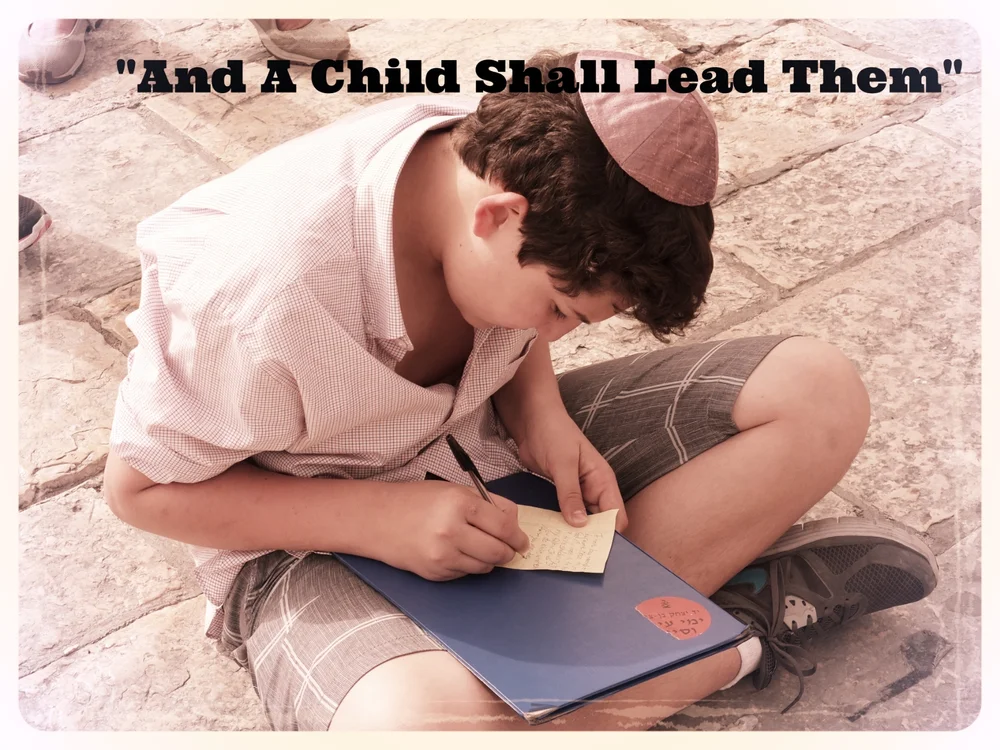Sh'ma Yis'ra'eil Adonai Eloheinu Adonai echad.
Hear, Israel, the Lord is our God, the Lord is One.
“THE MOST FAMOUS PRAYER IN JUDAISM IS THE “SH’MA, whose opening paragraph reads:” And you shall speak of them [the Torah’s laws] when you sit in your house, when you walk by the way, when you lie down, and when you rise up. … And you shall write them upon the doorposts of your house and upon your gates” (Deuteronomy 6:7,9). The Hebrew word for doorpost is mezuzah, and for thousands of years Jews have posted small boxes, also known as mezuzot, on their doorposts. Inside each box is a small scroll, which must be written by a scribe. It contains the first and second paragraphs of the Sh’ma, including the commandment concerning the mezuzah.”
Questions for Discussion
* Why is the second line of the Shema sang more quiety than the first?
* Why do you think the Shema is considered the most central prayer in Judaism?
* Where do you find the Shema printed on a tiny parchment and coiled into a rectangular box?
* Rabbi Akiva supposedly recited the Shema as he was burned at the stake for rebelling against the Romans in 132 C.E.
* "The quintessential martyr, Akiva died al kiddush ha-Shem—to sanctify God’s name. During the more than eighteen hundred years since, Jews have studied his life as a model both of how to live and how to die." - Rabbi Joseph Telushkin, "Jewish Literacy"
* One synagogue changed the words of the Shema to: Shema Yisrael, echad ameinu, adam echad. Hear, O Israel, Our People is One, Humanity is One. What do you think of this change?
“The mitzvah of study is commanded in the Torah in a paragraph that forms part of the *Sh’ma prayer.
Parents are instructed: “And you shall teach [the Torah] to your children, and you shall speak of it, when you sit in your house, when you walk on the road, when you lie down and when you rise up” (Deuteronomy 6:7). ”
ALTHOUGH JUDAISM HAS NO CATECHISM, THE BIBLICAL VERSE “SH’MA Yisra’el, Adonai Eloheinu, Adonai Ekhad—Hear, O Israel, the Lord Is Our God, the Lord Is One” (Deuteronomy 6:4), comes closest to being Judaism’s credo. In just six Hebrew words, it sums up Judaism’s belief in monotheism, and its rejection of all idols. For two thousand years, the Sh’ma has been the verse with which many Jewish martyrs have gone to their deaths, while those fortunate enough to meet more peaceful endings try to die with the Sh’ma on their lips. To this day, Jews are supposed to recite the Sh’ma four times a day, twice during morning prayers, once during the evening service, and, finally, at home before going to sleep. In addition to the first six words, the Sh’ma usually is recited with three additional paragraphs, all from the Torah (Deuteronomy 6:4–9; Deuteronomy 11:13–21; and Numbers 15:37–41). The range of Jewish concepts and laws enumerated in these paragraphs is so significant that most of them have separate entries in this book. They include the commandments of:
*Monotheism
*Loving God, “and you shall love the Lord your God, with all your heart, with all your soul, and with all your means”
*Teaching Judaism to one’s children
*Tefillin
*Mezuzah
*Reward and punishment
*Tzitzit
- Joseph Telushkin, "Jewish Literacy"


